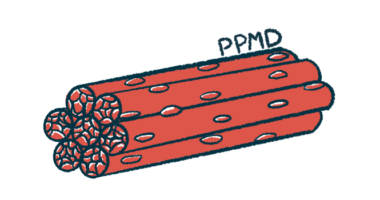FDA approves oral givinostat, as Duvyzat, to treat Duchenne MD
Therapy is 1st non-steroidal drug for patients with all genetic DMD variants
by |

The U.S. Food and Drug Administration (FDA) has approved Italfarmaco’s givinostat, which will now be marketed as Duvyzat, as an oral suspension to treat people with Duchenne muscular dystrophy (DMD) ages 6 and older.
Duvyzat becomes the first nonsteroidal therapy approved in the U.S. for patients with all genetic variants of DMD — the most common type of muscular dystrophy. The therapy ultimately intends to reduce inflammation and loss of muscle in patients, who typically are male.
“The FDA’s approval of Duvyzat for DMD, based on our robust and successful clinical development program, reflects Italfarmaco’s commitment to providing a safe and proven-effective therapy that can have a meaningful impact for people living with DMD,” Paolo Bettica, MD, PhD, chief medical officer at Italfarmaco, said in a company press release.
U.S. regulator Emily Freilich, MD, noted that the FDA “is committed to advancing the development of new therapies for DMD.”
“This approval provides another treatment option to help reduce the burden of this progressive, devastating disease for individuals impacted by DMD regardless of genetic mutation,” Freilich, director of the division of neurology 1, office of neuroscience, in the FDA’s Center for Drug Evaluation and Research, said in an agency press release.
Duchenne advocates say they’re ‘thrilled’ by Duvyzat approval
Duvyzat comes in a concentration of 8.86 mg/mL and is to be taken twice daily with food. The recommended dose is based on patients’ body weight, and ranges from 22.2 to 53.2 mg given two times per day.
The FDA’s approval comes after the agency granted Duvyzat priority review last year, which should have shortened the time to a final decision from the standard 10 months to six.
Weeks before the decision was expected, however, the FDA extended its deadline by three months to allow added time for regulators to review additional information submitted by the company as part of a new drug application.
The decision from the FDA was met with excitement by the DMD community.
“We are pleased that the FDA approved Duvyzat (givinostat) for individuals with Duchenne age six and older,” Debra Miller, founder and CEO at CureDuchenne, told Muscular Dystrophy News Today via email.
“This adds to [the] list of approved treatments for families facing this devastating disease and is an important step forward in accelerating transformative treatments for everyone independent of their genetic mutation,” Miller said.
This brings great hope for the Duchenne community, and we believe this will be a key therapy to prevent disease progression in Duchenne.
Pat Furlong, founding president and CEO at Parent Project Muscular Dystrophy, said in the Italfarmaco release that the nonprofit was “thrilled with the FDA’s approval of Duvyzat, a new therapy for DMD.”
“This brings great hope for the Duchenne community, and we believe this will be a key therapy to prevent disease progression in Duchenne,” Furlong said.
The approval also was welcomed by the Muscular Dystrophy Association (MDA).
Paul Melmeyer, the MDA’s vice president of public policy and advocacy, said the approval “demonstrates the FDA’s understanding of the importance of slowing disease progression in diseases like Duchenne, and how meaningful that is to the community.”
“We are proud to partner with the FDA to help speed the approval of new therapies that slow disease progression and ensure the voice of patients and their families is heard,” said in an MDA press release.
Duvyzat approval based on positive data from Phase 3 trial
DMD is caused by mutations in the DMD gene, which codes for a protein called dystrophin. Without dystrophin, muscles become prone to damage by wear and tear, resulting in the loss of muscle tissue and function.
Duvyzat works by blocking enzymes of the histone deacetylase (HDAC) family — involved in regulating cellular genetic activity — which are overactive in DMD.
The treatment’s approval was based on positive data from a Phase 3 clinical trial called EPIDYS (NCT02851797). It involved 179 boys with DMD, ages 6 to 17, who were able to walk and on a stable dose of corticosteroids.
The boys were randomly assigned to Duvyzat or a placebo twice daily for about 1.5 years, and then tested on the time it took them to climb four stairs. Over this period, Duvyzat was shown to slow muscle function decline. Boys given the therapy took an average 1.78 seconds fewer to climb four stairs versus those on the placebo.
Duvyzat also slowed a decline in the North Star Ambulatory Assessment score (NSAA), a measure of motor function in which a higher score reflects better performance. NSAA scores were reduced by 40% less in boys on Duvyzat.
Moreover, the participants on Duvyzat did not build up as much fat tissue in muscle. Specifically, the therapy led to 30% less fat infiltration into the thigh muscle, the data showed.
The most common side effects reported with Duvyzat in EPIDYS were diarrhea, abdominal pain, a lower number of platelets, and high levels of triglycerides, a type of fat. No treatment-related side effects were found to be serious or severe. Side effects were managed with monitoring and dose adjustments.
Developer now focused on making treatment available to patients
“There is a tremendous unmet need for novel therapies in DMD that can achieve meaningful benefits for a broad range of patients,” said Craig M. McDonald, MD, an EPIDYS trial investigator at University of California Davis Health.
“Duvyzat’s unique mechanism of action has shown a positive risk/benefit profile and the ability to delay disease progression, supporting its potential to become a key component of the standard of care for people living with DMD,” McDonald said.
According to Italfarmaco, the median follow-up in the ongoing open-label, long-term safety and tolerability study (NCT03373968) is an additional three years.
In Europe, Duvyzat is currently under regulatory review as a treatment for DMD. It’s been granted orphan drug designation by European Union regulators.
In the U.S., givinostat was granted orphan drug, fast track, and rare pediatric disease designations. Orphan drug status is given to treatments for rare diseases, while a rare pediatric disease designation is granted for therapies for such conditions when they primarily affect patients younger than age 18. Like fast track status, they are designed to get therapies reviewed and to patients more quickly.
Bettica said Italfarmaco’s “focus now is to make Duvyzat available as a treatment for DMD management in the U.S. as quickly as possible.”
“We are grateful for the support of those living with DMD and their dedicated caregivers, which played a central role in helping us reach this landmark FDA approval,” Bettica said.
ITF Therapeutics, an Italfarmaco subsidiary, will be responsible for the commercialization of Duvyzat in the U.S., the company said.










